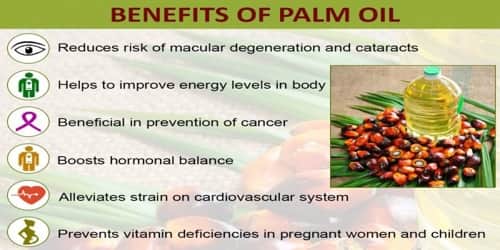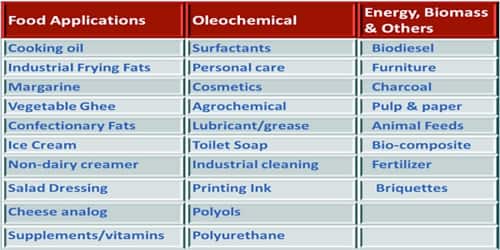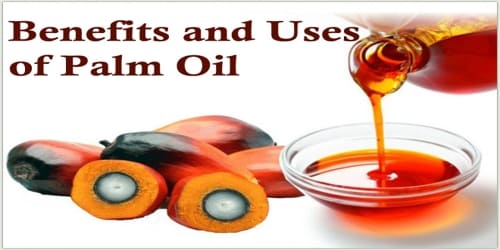Benefits and Uses of Palm Oil
Introduction: Palm oil, an edible vegetable oil rich in saturated fats and free of trans fats, is derived from the mesocarp (reddish pulp) of the fruit of the oil palms, mainly the African oil palm (Elaeis guineensis) and to some extent from the South American oil palm (Elaeis oleifera) and the maripa palm (Attalea maripa).
Historical accounts suggest that palm oil was a part of the diet of indigenous populations. At present, it has become the second most traded oil crop in the world, after soy, with Malaysia and Indonesia as its main producers.
In 2016, the global production of palm oil was estimated at 62.6M tonnes, 2.7M tonnes more than in 2015. The palm oil production value was estimated at $39.3B in 2016, an increase of $2.4B (or +7%) against the production figure recorded in the previous year. According to FAO forecasts by 2020, the global demand for palm oil will double, and the triple by 2050.
Benefits of Palm Oil: Palm oil has been linked to several health benefits, including protecting brain function, reducing heart disease risk factors and improving vitamin A status.

Studies have found that unrefined palm oil plays a role in promoting your cardiovascular health. In one study published in the British Journal of Biomedical Science, it was reported that despite the high levels of saturated fat in palm oil, the oil did not contribute to atherosclerosis and/or arterial thrombosis.8 Researchers suggested that this is due to the ratio of saturated to unsaturated fats in the oil, as well as its rich nutrient profile.
- Palm oil is an excellent source of tocotrienols, a form of vitamin E with strong antioxidant properties that may support brain health.
- Palm oil has been credited with providing protection against heart disease.
- As a fat-rich oil, palm oil helps provide energy and enhance the absorption of fat-soluble nutrients such as vitamins A, D, and E.
- Palm oil is an excellent source of energy; its composition provides our body with all the nourishing and strength building nutrients it needs. The beta-carotene in palm oil also helps balance our hormonal levels.
- Palm oil’s antioxidant supply is also found to help prevent neurological degeneration by stopping free radicals that damage brain and nerve tissues, and promoting circulation, which increases our protection against diseases like dementia, Alzheimer’s, Parkinson’s, and other mental conditions.
- Tocopherols, a form of vitamin E, are natural antioxidants that can help to prevent cancer by neutralizing free radicals. Free radicals cause healthy cells to mutate into cancerous cells, so high levels of tocopherol as is present in palm oil are necessary.
- Palm oil makes the skin naturally soft and glossy without it getting a greasy appearance. This is the reason the oil is a key ingredient in many soap bars and skin creams. It also provides relief to ragged cuticles and itchy skin.
- Omega 3 fatty acids are powerful nutrients that significantly enhance our bodily functions. Palm oil contains a small amount of omega 3 fatty acids that help in slowing down the loss of cognitive function in patients suffering from Alzheimer’s. Moreover, it also is very useful in protecting the body from arthritis and such diseases.
- The deficiency of vitamin could be harmful to a pregnant woman as well as her unborn child. Palm oil contains Vitamin D, A, and E which is beneficial for the health. A pregnant woman should have Palm oil in her diet to prevent the vitamin deficiencies.
Palm oil has multiple health benefits, with a good amount of essential linolenic acids and other fatty acids it can boost our brain healthy as well. As with all fatty foods, if consumed in moderation it will give more benefits. It is also easier for the body to digest.

Uses of Palm oil: The use of Palm oil in the commercial food industry is widespread because of its lower cost and the high oxidative stability of the refined product when used for frying. Palm Oil is used in around 50% of products consumers purchase and use on a daily basis. Palm Oil and its derivatives are otherwise known as fractions of the oil are used in the manufacture of prepackaged food, cosmetics, cleaning products, hair care, soaps, and personal care items. Palm Wax is used in the manufacture of candles. It is also used to manufacture biofuel and has become what is called the green fuel option for Motor Vehicles, shipping, and Aircraft fuel. Palm is also used as feed for livestock named as palm kernel cake which is a by-product of palm kernel oil.
Information Source:
















